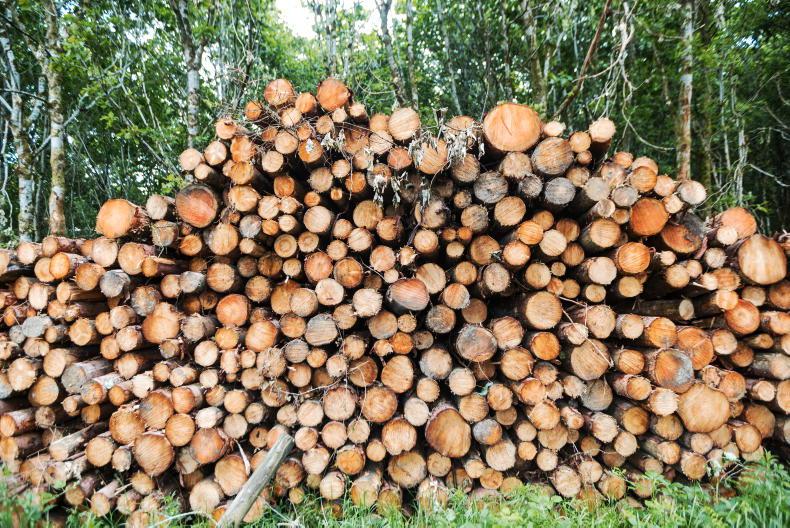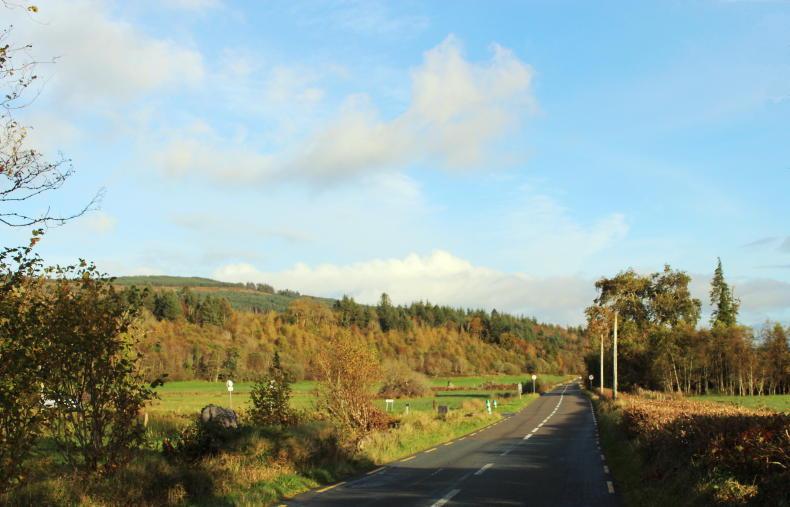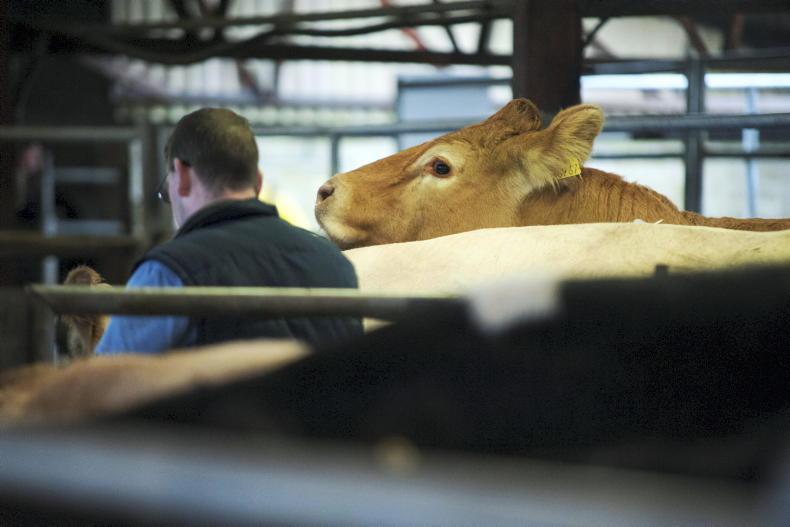The resilience of the forestry and forest products sector is being tested at the moment due to an unprecedented number of blanket submissions opposing afforestation, felling licences and forest roading.
This is negatively affecting Coillte, Irish family-owned sawmills, panel board mills, contractors, forestry companies, foresters and private forest owners – mainly farmers.
While most of these stakeholders have been aware that licensing has virtually ceased since last August, it took the recent MacKinnon review to outline the bleakness of the position.
MacKinnon explained how increasing submissions – objections – from individuals and organisations on applications have slowed the approval system down to a standstill.
He estimated that if submissions on roads and felling applications are added to afforestation the figure rises to over 1,000.
Sawmills
“Most of the 16,000 people employed in forestry will feel the brunt of this over the coming weeks and months,” said a sawmill spokesperson.
Coillte has acknowledged the seriousness of the situation
“So far, despite the work of the Forest Appeals Committee, the backlog of objections continues to increase and the inspectorate in the Forest Service and the Department of Agriculture, Food and the Marine (DAFM) seem ill-equipped to deal with it,” he said.
Coillte has acknowledged the seriousness of the situation and reassured its customers that it is “looking at all options to maintain production and keep customers supplied”. In a letter to sawmills on 4 December, the company stated: “I want to assure you that this is Coillte’s number one priority at the moment and it is being addressed at senior management level within the Forest Service and at ministerial level.”
Despite these assurances, Coillte is at the whim of serial submissions like everybody else and has withdrawn this month’s timber auction, with a second in January also under threat as sufficient felling licences are not in place.
Contractors
Private contractors with expensive harvesting and extraction units are hit particularly hard. A typical contractor is Michael Fahey who is based in Littleton, Co Tipperary.
“I am finishing harvesting two small lots at the moment and, after that, I have no further work as my clients are unable to receive felling licences,” he said.
I employ 18 people, most of them with mortgages and families to support
He has five machines including harvesters, forwarders and a digger. Most of his work is in harvesting but he provides a wide range of other operations including forest road construction, wood-chipping and tree care.
“I employ 18 people, most of them with mortgages and families to support,” he said. “These are likely to be out of work in the new year unless the licence approval system dramatically improves.”
Like most contractors, he has borrowed heavily in order to purchase machinery.
“I am currently paying back €2,700 every month for one harvester alone, which needs to work full-time to justify this investment,” he explained.
“This is the first time in 47 years that I and my staff are out of work as a result of a situation that is not of our making.”
Afforestation
Afforestation approvals have now reduced to a trickle.
“Every obstacle on planting application including referrals to ecologists and a myriad of public bodies is being placed on afforestation at the moment,” maintained a spokesperson for one of the forestry companies.
These concerns exist throughout the forest chain from nursery owners to contractors
“MacKinnon was right when he quoted foresters as being concerned for their future as a result of delays in handling applications and the potential for appeals,” he said.
“These concerns exist throughout the forest chain from nursery owners to contractors and from harvesting to processing.
“A lack of a consistent pro-forestry approach by the inspectorate is a factor where, as MacKinnon said, ‘actions by some [and] inaction by others can have a negative impact on the livelihood of individuals’.”
Forest Industries Ireland (FII) met the Department of Agriculture, Food and the Marine, Coillte and sawmillers last week and is meeting stakeholders this week on trying to chart a future out of the current impasse.
Gavigan hits back at suggested banning of renewable wood energy
The model countries of renewable energy in Europe are Finland, Denmark, Austria, Latvia and Sweden. It’s easy for Austria which has the added green energy advantage of hydropower. However, Austria’s Bioenergy policies and status of implementation states: “The largest potential [in renewable energy] is seen as wood.”
Austrians, like the Scandinavians, place strong emphasis on wood energy. These are all on course to achieve renewable energy targets of between 30% and 50% by 2020 while Ireland will at best achieve 13% of its energy requirements from renewables.
These countries promote wood as a part of the renewable energy mix but not Ireland, it seems.
Properly dried and combusted, wood fuel is an environmentally safe fuel
Recent reports that Taoiseach Leo Varadkar and Minister for Health Simon Harris are considering a ban on all solid fuels, including wood fuel, drew a quick response from Noel Gavigan on behalf of the Irish BioEnergy Association (IrBEA).
“Wood fuels are an essential part in assisting Ireland to reduce its greenhouse gas emissions and transiting to a low-carbon economy,” he maintained.
“Properly dried and combusted, wood fuel is an environmentally safe fuel. IrBEA is specifically focused on developing wood fuels for their considerable benefits in terms of reducing greenhouse gases (GHGs) and providing a cost-effective and sustainable source of heating and efficient combined heat and power.”
GHG reduction
Gavigan maintains that wood fuel offers over 90% reduction in GHGs over fossil fuels.
“By only using properly dried wood fuels we can immediately reduce any particulate emissions to one-third. Further to this by using better technology such as enclosed stoves and now EU-certified Ecodesign stoves, emissions are reduced by 89%,” he said.
IrBEA has sent a number of key recommendations to the Department on the regulation of firewood for sale in Ireland.
We see this as a first and critical step to reducing emissions of carbon dioxide, particulates and nitrous oxides
“Specifically, we are calling for legislation to ban the retail sale of firewood with moisture content above 20% by the year 2022, with an interim limit of 25% by September 2020.
“We see this as a first and critical step to reducing emissions of carbon dioxide, particulates and nitrous oxides.”
Perhaps Minister Creed might remind An Taoiseach of the role of wood energy in climate change and likewise Minister of State Andrew Doyle might provide his constituency colleague Minister Harris with information on the benefits of renewable wood energy.
He could start by bringing him to McCauley Wood Fuels in Mohill, Co Leitrim, where a small operation is chipping 400t of pulpwood logs weekly sourced mainly in Leitrim forests. This is displacing 150,000 litres of heating oil very week.
This could be replicated in every village and town throughout Ireland as it is in other climate change conscious countries.
The resilience of the forestry and forest products sector is being tested at the moment due to an unprecedented number of blanket submissions opposing afforestation, felling licences and forest roading.
This is negatively affecting Coillte, Irish family-owned sawmills, panel board mills, contractors, forestry companies, foresters and private forest owners – mainly farmers.
While most of these stakeholders have been aware that licensing has virtually ceased since last August, it took the recent MacKinnon review to outline the bleakness of the position.
MacKinnon explained how increasing submissions – objections – from individuals and organisations on applications have slowed the approval system down to a standstill.
He estimated that if submissions on roads and felling applications are added to afforestation the figure rises to over 1,000.
Sawmills
“Most of the 16,000 people employed in forestry will feel the brunt of this over the coming weeks and months,” said a sawmill spokesperson.
Coillte has acknowledged the seriousness of the situation
“So far, despite the work of the Forest Appeals Committee, the backlog of objections continues to increase and the inspectorate in the Forest Service and the Department of Agriculture, Food and the Marine (DAFM) seem ill-equipped to deal with it,” he said.
Coillte has acknowledged the seriousness of the situation and reassured its customers that it is “looking at all options to maintain production and keep customers supplied”. In a letter to sawmills on 4 December, the company stated: “I want to assure you that this is Coillte’s number one priority at the moment and it is being addressed at senior management level within the Forest Service and at ministerial level.”
Despite these assurances, Coillte is at the whim of serial submissions like everybody else and has withdrawn this month’s timber auction, with a second in January also under threat as sufficient felling licences are not in place.
Contractors
Private contractors with expensive harvesting and extraction units are hit particularly hard. A typical contractor is Michael Fahey who is based in Littleton, Co Tipperary.
“I am finishing harvesting two small lots at the moment and, after that, I have no further work as my clients are unable to receive felling licences,” he said.
I employ 18 people, most of them with mortgages and families to support
He has five machines including harvesters, forwarders and a digger. Most of his work is in harvesting but he provides a wide range of other operations including forest road construction, wood-chipping and tree care.
“I employ 18 people, most of them with mortgages and families to support,” he said. “These are likely to be out of work in the new year unless the licence approval system dramatically improves.”
Like most contractors, he has borrowed heavily in order to purchase machinery.
“I am currently paying back €2,700 every month for one harvester alone, which needs to work full-time to justify this investment,” he explained.
“This is the first time in 47 years that I and my staff are out of work as a result of a situation that is not of our making.”
Afforestation
Afforestation approvals have now reduced to a trickle.
“Every obstacle on planting application including referrals to ecologists and a myriad of public bodies is being placed on afforestation at the moment,” maintained a spokesperson for one of the forestry companies.
These concerns exist throughout the forest chain from nursery owners to contractors
“MacKinnon was right when he quoted foresters as being concerned for their future as a result of delays in handling applications and the potential for appeals,” he said.
“These concerns exist throughout the forest chain from nursery owners to contractors and from harvesting to processing.
“A lack of a consistent pro-forestry approach by the inspectorate is a factor where, as MacKinnon said, ‘actions by some [and] inaction by others can have a negative impact on the livelihood of individuals’.”
Forest Industries Ireland (FII) met the Department of Agriculture, Food and the Marine, Coillte and sawmillers last week and is meeting stakeholders this week on trying to chart a future out of the current impasse.
Gavigan hits back at suggested banning of renewable wood energy
The model countries of renewable energy in Europe are Finland, Denmark, Austria, Latvia and Sweden. It’s easy for Austria which has the added green energy advantage of hydropower. However, Austria’s Bioenergy policies and status of implementation states: “The largest potential [in renewable energy] is seen as wood.”
Austrians, like the Scandinavians, place strong emphasis on wood energy. These are all on course to achieve renewable energy targets of between 30% and 50% by 2020 while Ireland will at best achieve 13% of its energy requirements from renewables.
These countries promote wood as a part of the renewable energy mix but not Ireland, it seems.
Properly dried and combusted, wood fuel is an environmentally safe fuel
Recent reports that Taoiseach Leo Varadkar and Minister for Health Simon Harris are considering a ban on all solid fuels, including wood fuel, drew a quick response from Noel Gavigan on behalf of the Irish BioEnergy Association (IrBEA).
“Wood fuels are an essential part in assisting Ireland to reduce its greenhouse gas emissions and transiting to a low-carbon economy,” he maintained.
“Properly dried and combusted, wood fuel is an environmentally safe fuel. IrBEA is specifically focused on developing wood fuels for their considerable benefits in terms of reducing greenhouse gases (GHGs) and providing a cost-effective and sustainable source of heating and efficient combined heat and power.”
GHG reduction
Gavigan maintains that wood fuel offers over 90% reduction in GHGs over fossil fuels.
“By only using properly dried wood fuels we can immediately reduce any particulate emissions to one-third. Further to this by using better technology such as enclosed stoves and now EU-certified Ecodesign stoves, emissions are reduced by 89%,” he said.
IrBEA has sent a number of key recommendations to the Department on the regulation of firewood for sale in Ireland.
We see this as a first and critical step to reducing emissions of carbon dioxide, particulates and nitrous oxides
“Specifically, we are calling for legislation to ban the retail sale of firewood with moisture content above 20% by the year 2022, with an interim limit of 25% by September 2020.
“We see this as a first and critical step to reducing emissions of carbon dioxide, particulates and nitrous oxides.”
Perhaps Minister Creed might remind An Taoiseach of the role of wood energy in climate change and likewise Minister of State Andrew Doyle might provide his constituency colleague Minister Harris with information on the benefits of renewable wood energy.
He could start by bringing him to McCauley Wood Fuels in Mohill, Co Leitrim, where a small operation is chipping 400t of pulpwood logs weekly sourced mainly in Leitrim forests. This is displacing 150,000 litres of heating oil very week.
This could be replicated in every village and town throughout Ireland as it is in other climate change conscious countries.










SHARING OPTIONS